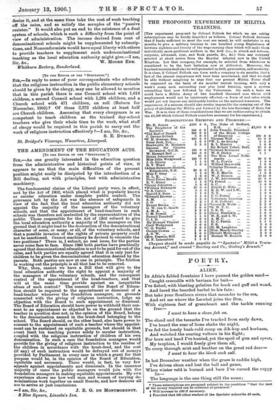THE AMENDMENT OF THE EDUCATION ACTS.
[To THE EDITOR OP THE "SPECTATOR."] SIR,—As one greatly interested in the education question from the administrative and historical points of view, it appears to me that the main difficulties of the present position might easily be dissipated by the introduction of a Bill dealing, not with principles, but with administrative
machinery.
The fundamental claims of the Liberal party were, in effect, met by the Act of 1902, which placed what is popularly known as secular education under complete public control. The grievance left by the Act was the absence of safeguards in view of the fact that the local education authority did not appoint the majority of the managers of the voluntary schools, and that the appointment of head-teachers in such schools was therefore not controlled by the representatives of the public. Those responsible for the Act of 1902 refused to give the local education authority a majority of the managers on the ground that it might lead to the destruction of the denominational character of some, or many, or all, of the voluntary schools, and that a possible invasion of the rights of private property could not be sanctioned. Cannot machinery be devised to reconcile the two positions ? There is, I submit, no real issue, for the parties never come face to face. Since 1902 both parties have practically agreed that denominational education is not to be paid for out of the rates, and both parties are equally agreed that it is only just for children to be given the denominational education desired by the parents. Both parties are now at one in principle. The friction in working out the principle is all that has to be removed.
Why, then, cannot we have a Bill that will give to the local education authority the right to appoint a majority of the managers of the voluntary schools, and the consequent control of the appointment of the head-teachers, and that will at the same time provide against an inequitable abuse of such control? The consent of the Board of Educa- tion should be required to the appointment or dismissal of a head-teacher whenever the foundation managers, on grounds connected with the giving of religious instruction, lodge an objection with the Board to such appointment or dismissal. The Board of Education should have power to withhold their con- sent to an appointment so objected to on the ground that the teacher in question does not, in the opinion of the Board, belong to the denomination named in the trust-deed belonging to the school. The Board should, on the other hand, also have power to consent to the appointment of such a teacher where the appoint- ment can be sustained on equitable grounds, but should in that event limit his teaching powers solely to secular instruction, coupled with the religious instruction of children of his own denomination. In such a case the foundation managers would provide for the giving of religious instruction to the residue of the children in accordance with the trust-deed, and the cost (if any) of such instruction would be defrayed out of moneys provided by Parliament in every case in which a grant for that purpose would be, in the opinion of the Board of Education, equitable and necessary. There would, in fact, be very few appeals against appointments and dismissals. In the immense majority of cases the public managers would join with the foundation managers in making equitable appointments. My own experience shows me how well men and women of varying de- nominations work together on small Boards, and how desirous all are to arrive at just conclusions.










































 Previous page
Previous page